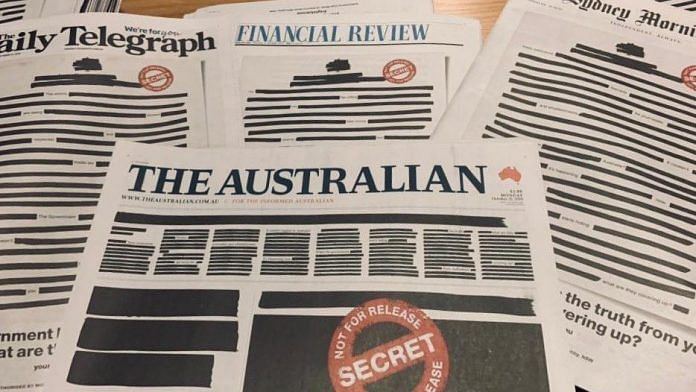New Delhi: In an unprecedented move, several Australian newspapers blacked out front pages Monday as part of a united protest against curbs on press freedom and government secrecy.
The move is part of a decade-old media campaign — ‘Your right to know’ — against a growing culture of secrecy that restricts “journalists’ ability to hold the powerful to account”.
Major Australian dallies, which are competitors, such as The Sydney Morning Herald, The Australian and The Australian Financial Review, redacted their front-pages to “give the impression it had been censored similar to how classified government documents are”.
Advertisements were also released across Australia’s TV channels, asking the audience, ‘When the government hides the truth from you, what are they covering up?’
75 legislations behind the media campaign
The campaign was launched over a decade ago by a coalition of Australia’s leading media organisations and industry groups to “protect the Australian public’s right to know” what the government they elected was doing.
At the heart of this campaign were the “75 pieces of federal legislations” enacted over the years since 2001 (in the aftermath of 9/11), which aimed to protect the public from “national security threats”.
The media organisations contend that these laws are now being used to curb press freedom.
In essence, by categorising something as either a ‘state secret’ or ‘against public interest’, the government has managed to control what media can and can’t report, they say.
The issues that the media is not being allowed to report include “government’s potential for misuse of personal data”, “public funds spent on political campaigns”, “climate change” or “complaints against aged care homes”, noted a report in the Herald Sun.
Also read: Caravan editor wants UK and Canada’s vigilance on India’s press freedom after London spat
The trigger
Although the Australian media has been grappling with restrictions for a while, the Monday protest seems to have been triggered after a news organisation and a journalist were raided recently.
“The straw that broke the camel’s back were the raids on News Corp journalist Annika Smethurst (who now faces possible criminal charges, ironically because she reported the government was considering new powers to spy on all of us) and an unrelated raid on the ABC headquarters after a report detailing incidents of Australian special forces troops killing men and children in Afghanistan,” according to a report in the Herald Sun.
These raids not only provoked Australian news organisations into action, but also drew flak from the international media. BBC had called the raids “deeply troubling”.
‘It’s about defending the basic right of every Australian’
Most heads and top editors of these media organisations have spoken out against the government’s move to suppress press freedom and voiced their support to the ‘Your right to know’ campaign.
“It’s about defending the basic right of every Australian to be properly informed about the important decisions the government is making in their name,” said Hugh Marks, chief executive officer of Nine News.
Michael Miller, executive chairman of News Corp, also put out a strongly-worded statement. “It’s unprecedented to see the front page of every single newspaper pointing out the same issue we are challenged with having to deal with, but this is serious. It’s serious for all Australians, not just for media, but it’s our job to actually serve our communities.”
What does the campaign seek to achieve?
The campaign demands six changes to the existing Australian laws, which, the country’s media says, will go a long way in protecting press freedom.
According to the Herald Sun, the six proposed legislative reforms include:
- The right to contest any kind of search warrant on journalists or news organisations before the warrant is issued
- Law change to ensure public sector whistleblowers are adequately protected
- A new regime that limits which documents can be marked ‘secret’
- Review of Freedom of Information laws
- That journalists be exempt from national security laws enacted over the past seven years that currently can put them in jail for doing their job
- Reform to defamation laws
Also read: New I&B minister Prakash Javadekar invokes Emergency to stress on press freedom



